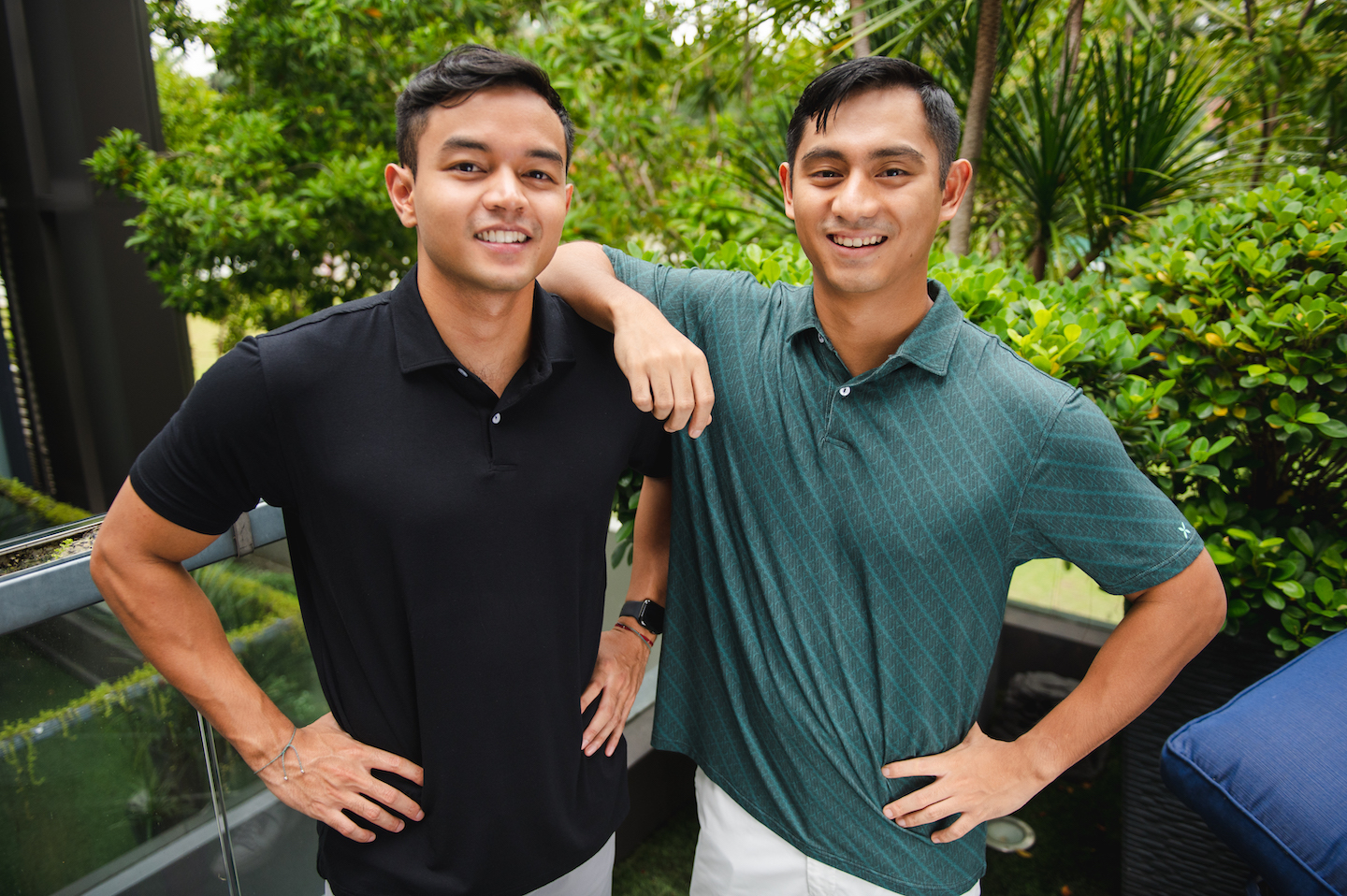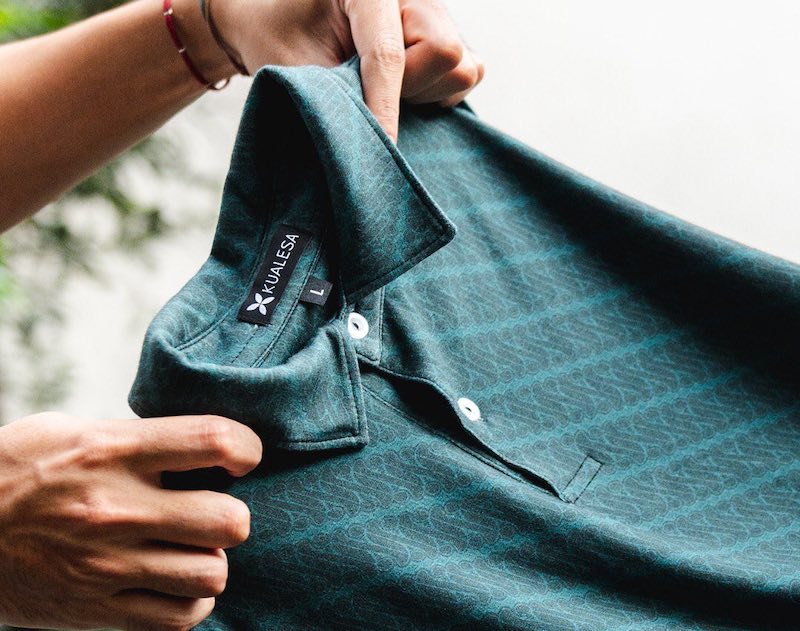
Ariff Faisal (left) with co-founder and COO Haris Kamal (All photos: Kualesa)
Bamboo fabric, referring to textiles made from the bamboo plant, has been used for thousands of years in East Asia but it is only in recent times that manufacturing processes are modernised and its usage applicable to global contemporary needs. From a product perspective, it is breathable, stretchable, hypoallergenic and thinner than cotton while retaining a similar tensile strength. When manufactured properly, bamboo fabric is also sustainable as this hardy plant is extremely fast-growing and thrives in various environments.
When engineer turned consultant Ariff Faisal wanted to parlay his passion for brand-building and sustainable solutions into an entrepreneurial endeavour, research led him to this uniquely comfortable and sturdy material. “As a complete product, bamboo fabric is comfortable. As a plant, bamboo grows quickly, it sequesters a lot more carbon dioxide than hardwood trees and uses less water and pesticides to grow than cotton. There were a lot of reasons to go with it, and so I did,” he says.
Kualesa — a portmanteau of the words kuat and selesa, meaning strong and comfortable in Bahasa Malaysia — was established earlier this year with two products that CEO Ariff and chief operating officer Haris Kamal knew all too well after more than a whole year of working from home: round-necked T-shirts and collared polo tees. “We decided on starting out with what we knew best, and what we wore most of the time. The idea was to create a collection of basics that was comfortable and multi-occasional — wear it for work, to run errands or for a casual dinner at home,” Ariff says. The completed products are shipped directly from China, where they are made in factories that employ environmentally sound processes.
Although the defining features of Kualesa’s apparel are comfort and durability, its raison d’etre is also to give consumers sustainable choices when it comes to clothing. “My eco-conscious side woke up in the last few years or so,” Ariff shares. “I went snorkelling in Indonesia and instead of the lush, colourful corals I was expecting, they were all grey and dead. It was quite shocking, but it made me more aware of the major environmental issues affecting the planet.”
kualesa.jpeg

For example, the problem of landfills and fast fashion plays a part in this — cheaply produced synthetic fabrics do not last and do not decompose. Upon examining his own wardrobe, Ariff realised he was guilty of owning far too many pieces of clothing made from planet-unfriendly fabrics and vowed to make a change. After unearthing the many advantages of bamboo fabric, Kualesa was born as a company that did things a little differently and had a conscience of its own. To complement its planet-friendly products, Kualesa’s mailer bags, made from corn starch and water-based inks, are fully biodegradable and compostable.
Ariff, who complemented his engineering qualifications with financial internships in London, drew on his corporate experience to conceptualise and run Kualesa. “Consulting skill sets really set you up quite well for entrepreneurship,” he says thoughtfully. “I knew I had the know-how to do this, plus my years in consulting covered the Asean region, specifically, fast-moving consumer goods.” Together with Haris, Ariff contacted manufacturers in China, established a storage and logistics system in Malaysia and got their e-commerce platform going.
The timing was perfect — with so many people working from home, consumers were on the lookout for basics that could do double duty, and online shopping was the preferred mode to do this. Kualesa has not felt the compulsion to establish a bricks-and-mortar store since the popularity of online shopping has soared, and it has also been able to bank on the growing generation of buyers who prefer — and can afford — clothing that does not damage the environment.
Those are the easy parts, though. “The challenges of establishing a business in the pandemic is that I can’t negotiate and meet with my manufacturers, which is ordinarily how I would have done it. Yes, you can meet via video call, but establishing a supplier relationship isn’t the same that way,” he says wryly. At present, Kualesa’s product range consists of solid-coloured round-neck T-shirts, slightly more formal collared polo T-shirts and a new range of batik T-shirts featuring muted colours and subtle, geometric prints. They range from RM161 to RM228, and Ariff hopes that at some point, he will be able to work out better deals with his manufacturers and pass on the economies of scale to customers.
This will also happen as sales pick up — right now, 80% of purchases are made in Malaysia, with the remainder from Asean. “My plan, from the start, was to provide the option of sustainably and responsibly made high-quality apparel to consumers in this whole region. Patagonia is a great brand that does this too, but shipping is expensive and takes time. Kualesa’s products will take a much shorter time, and because it’s from so much nearer, the carbon footprint is also much less.”
Ariff plans to expand Kualesa’s marketing budget to include Singapore, Thailand, Vietnam, Indonesia and the Philippines, where similar weather concerns and fashion inclinations will make its products an easy sell. He also hopes to research other sustainable fabrics, and expand the brand’s product range to more subcategories of menswear, and beginning next year, womenswear as well. “The concept would be the same, in that we would focus on basics that will get a lot of use. Sustainability is the heart of what we do, and style is a function of that.”
In addition to all this, Kualesa has committed to planting one tree in the rainforests of Pahang for every order made. By utilising the skills and knowledge of the Orang Asli in the area, this initiative will not only provide them with meaningful work, but also ensure that the replanting efforts maximise biodiversity for rainforest ecosystems to thrive.
“With Kualesa, we want our customers to make responsible and informed choices about what they wear,” concludes Ariff. “Rather than multiple pieces of clothing, we are suggesting the notion of well-made clothes, crafted from planet-friendly fabrics and that you can use for more than just one occasion. Less is more, and that is something we passionately believe in.”
This article first appeared on Sept 20, 2021 in The Edge Malaysia.


